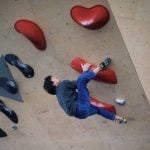Behind the Closures…is a series that interviews gym owners, managers and employees during the Coronavirus (COVID-19) pandemic—and looks at how the situation is impacting facilities and communities around North America.
This week CBJ headed to the South Central, U.S., to chat with a popular Oklahoma gym about keeping busy amid closure: rolling out social media content; keeping a gear shop open as an essential business; and starting staff projects that can be completed once everything opens up.

Name: Hannah Mosier
Title: Assistant Manager, Climb Tulsa
Location: Tulsa, Oklahoma
CBJ: Climb Tulsa is temporary closed. So, let’s start with the topic of actual COVID-19 cases within your gym community. Have you had any confirmed staff or customer cases that you know of?
MOSIER: I am very grateful to say that I have not heard of any confirmed cases amongst our staff or our members.
CBJ: To backtrack a little, would you mind walking me through how the COVID-19 crisis hit Climb Tulsa, and what you were thinking as everything progressed?
MOSIER: For me it felt like the initial COVID-19 reaction here in Tulsa happened incredibly fast. I was in a village in Alaska for the two weeks prior to the shutdown, and when I came home on March 15th it felt like whiplash. On March 16th I went into the gym and our general manager, Clayton, asked me to begin calling the parents from our kids programs and inform them that we were canceling for the next week.
[adning id=”19811″]
At that point we had not yet officially decided to close, but by that evening—after lots of discussion—we made the decision to close temporarily and reassess weekly. We made the announcement to the public the next morning (March 17th). We had hoped to be able to make the decision ourselves to reopen within a few weeks. However, a few hours after our announcement the mayor of Tulsa mandated that all gyms—as well as many other businesses—close by midnight until further notice. I think we all agreed that it was best that we had made the choice to close ourselves before we were forced to close.
As everything was progressing, I feel as if my thoughts simply went into survival mode. Nobody truly knew what was going on or what would happen. But I knew the staff would be looking to the management, so I kept my focus on communication and giving directions. The first two weeks felt like we were constantly having to readjust—almost by the hour—to what new mandates or new information were being received concerning the virus. About a week in, I did begin to feel overwhelmed and unable to get any footing as everything seemed to be changing so fast. Once Tulsa mandated the Safer at Home Order things began to level out. Now I feel like we are all just waiting to hear from the city for our next steps.

CBJ: About that decision to close temporarily and reassess weekly… What was the general response of the Climb Tulsa customers to the closure?
MOSIER: The initial response from our members was incredibly positive. I think we were all surprised by the support we received. Most members chose to remain active, several called in to change their card information or to unfreeze so that they could be billed, and others have bought multiple gift cards from us. We were all very humbled and very grateful that so many people care about Climb Tulsa and the Climb Tulsa staff as much as they do.
CBJ: Climb Tulsa’s Facebook page mentioned that the gym had filmed practically three weeks’ worth of content. The plan seems to be to steadily roll out videos and other content on social media as the closure continues…which seems like a really proactive strategy. Where did that idea to backlog so much social media content come from?
MOSIER: One of the owners of Climb Tulsa, Jason Burks, has worked in production for a long time and owns his own company, called Retro Spec. Jason has always put a lot of emphasis on the quality of our social media content. He brought his team in one day to get as much content as he could to engage our members online.
Our social media presence has proven to be a great step to connecting with members. We have shared climbing stories, had giveaways and product reviews from our gear shop. The biggest thing we’ve done is have a weekly raffle for our active members in which we give away an item from our gear shop (approach shoes, Edelrid Giga Jul, rope bags, etc). This raffle was very well received and I think has helped show our members that we really are grateful for them and their support.

CBJ: One of the amazing aspects is that Climb Tulsa has managed to keep all 35 people on staff. How is that working?
MOSIER: In the beginning we were doing all that we could to maintain hours for our staff. We did deep cleans, CWA training, gear training, content creating, etc. However, once the city of Tulsa instated the Safer at Home Order we were no longer able to have staff working in the facility. Since then we have maintained pay for as long as we can and have recently applied for a small business loan to protect the income of our staff. Our gear shop has been considered an essential business since we are the only store in Tulsa to carry many items needed by rope service workers. We have put up an online catalog so that customers can call in orders and pick them up curbside; we also maintain the CDC guidelines.
Keeping the gear shop open has been very beneficial in maintaining some revenue in continuing to pay our staff. Only the managers are operating the gear shop, so I am in the facility 1-2 times a week. While in the facility I am making progress on the cleaning and organizing projects we started but could not yet finish. If I am not scheduled at the gym, then I am working from home accomplishing what I can. I am currently working on the logistics for new classes or trying to refine existing programs.
CBJ: I have been asking every gym employee this during interviews because I think there is value in hearing all ideas: How do gyms recover from this?
MOSIER: I don’t know how gyms will recover from this. It is definitely a big surprise to us all, and we are such a young industry. The impact of this is full of unknown variables; however, I am very hopeful. The people I have met in the climbing community see it as so much more than a workout or a hobby. Most climbers are committed to their community and they want to continue to see it grow and do well. In the first few weeks of this pandemic I have seen the community here in Tulsa fully support us, and many have personally reached out to us with encouraging messages.
I anticipate the next year to be rough while trying to recover, but I am thankful that we will have these members that support us when times are rough and care so much about the climbing community here in Tulsa.
Editor’s note
Items from Climb Tulsa’s gear shop cannot be shipped. However, if anyone wishes to support the gym from afar and plans to be swinging through Tulsa in the future, gym gift cards can be purchased here. From Climb Tulsa’s website: “Your gift card purchase now will help pay our employees and give you the flexibility of many purchase options when we reopen!”
Share your story
Are you leading a climbing gym through this unprecedented period of gym closures? Or, do you work for a gym that is now closed and have a story others could benefit from hearing? If so, please contact us and tell us about it.















